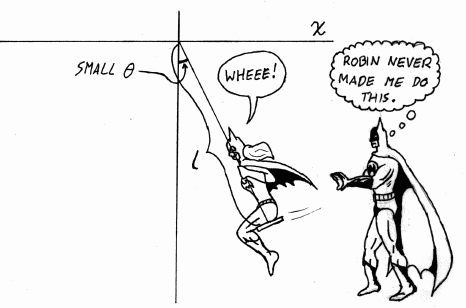


Next: Intergalactic Dating
Up: No Title
Previous: Formation of Saturn's Rings
Consider a child of mass m
sitting on a swing of length l, as in Figure 2.1.
Suppose the child is being pushed and pulled by her brother
with a force  .
.

-
What other forces are acting on the child?
-
Write down the x and y components of Newton's equation
of motion for the child.
-
For small angles of swing, show that the x position of the child
satisfies

where g is the acceleration due to gravity at the Earth's
surface.
Suppose that the brother pushes and pulls in a
periodic fashion, with  .
Also suppose that
the initial position and velocity of the child
are
.
Also suppose that
the initial position and velocity of the child
are  and
and  .
The child's position as a function of time is then given by
.
The child's position as a function of time is then given by

(You do not need to prove this. However, if you wish to
convince yourself that it is correct, just substitute x(t)
into (1) and check that the left-hand side equals the
right-hand side, then check that it satisfies the stated
initial conditions. An equation like (1) with a second derivative
in it must always be accompanied by two initial conditions
to specify a solution.)
-
Take
 and
and  .
Draw a sequence of diagrams
at times
.
Draw a sequence of diagrams
at times  showing
the successive positions of the swing
and the direction and relative magnitude (as an arrow)
of F(t) at each position.
(Draw the swing positions and
arrows roughly to scale, but don't be too fussy.)
showing
the successive positions of the swing
and the direction and relative magnitude (as an arrow)
of F(t) at each position.
(Draw the swing positions and
arrows roughly to scale, but don't be too fussy.)
-
Redo the above question for
 and
times
and
times 
 .
.
-
What happens when
 ? Is this realistic?
? Is this realistic?
-
Describe in your own words, as fully as you can, the analogy
between the child on a swing and, say, the 2:1 orbital
resonance between some hypothetical asteroid and Jupiter.
(There are many equally valid ways of answering this
question. Answer it in your own way.)



Next: Intergalactic Dating
Up: No Title
Previous: Formation of Saturn's Rings
Astronomy 7
Fri Sep 17 15:48:25 PDT 1999
![]() .
.

![]()
![]()